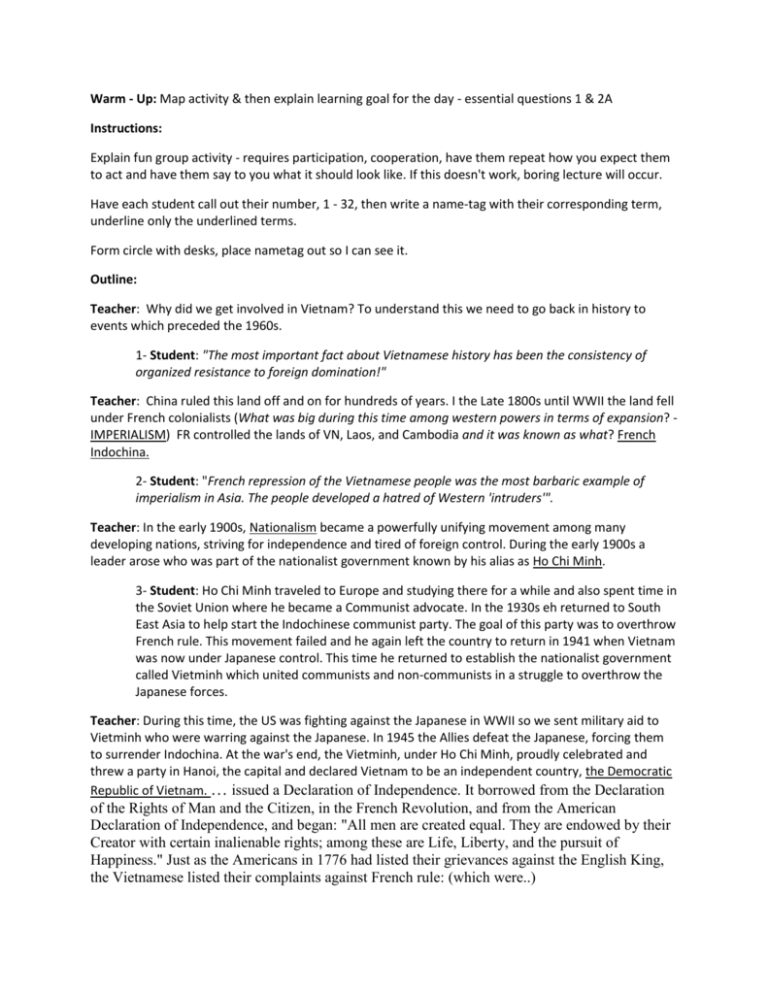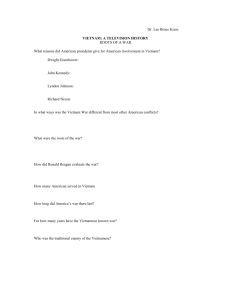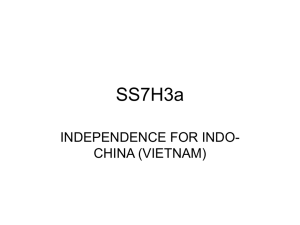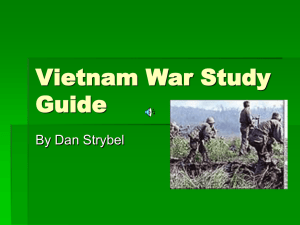Student – Teacher lesson – Getting into the war
advertisement

Warm - Up: Map activity & then explain learning goal for the day - essential questions 1 & 2A Instructions: Explain fun group activity - requires participation, cooperation, have them repeat how you expect them to act and have them say to you what it should look like. If this doesn't work, boring lecture will occur. Have each student call out their number, 1 - 32, then write a name-tag with their corresponding term, underline only the underlined terms. Form circle with desks, place nametag out so I can see it. Outline: Teacher: Why did we get involved in Vietnam? To understand this we need to go back in history to events which preceded the 1960s. 1- Student: "The most important fact about Vietnamese history has been the consistency of organized resistance to foreign domination!" Teacher: China ruled this land off and on for hundreds of years. I the Late 1800s until WWII the land fell under French colonialists (What was big during this time among western powers in terms of expansion? IMPERIALISM) FR controlled the lands of VN, Laos, and Cambodia and it was known as what? French Indochina. 2- Student: "French repression of the Vietnamese people was the most barbaric example of imperialism in Asia. The people developed a hatred of Western 'intruders'". Teacher: In the early 1900s, Nationalism became a powerfully unifying movement among many developing nations, striving for independence and tired of foreign control. During the early 1900s a leader arose who was part of the nationalist government known by his alias as Ho Chi Minh. 3- Student: Ho Chi Minh traveled to Europe and studying there for a while and also spent time in the Soviet Union where he became a Communist advocate. In the 1930s eh returned to South East Asia to help start the Indochinese communist party. The goal of this party was to overthrow French rule. This movement failed and he again left the country to return in 1941 when Vietnam was now under Japanese control. This time he returned to establish the nationalist government called Vietminh which united communists and non-communists in a struggle to overthrow the Japanese forces. Teacher: During this time, the US was fighting against the Japanese in WWII so we sent military aid to Vietminh who were warring against the Japanese. In 1945 the Allies defeat the Japanese, forcing them to surrender Indochina. At the war's end, the Vietminh, under Ho Chi Minh, proudly celebrated and threw a party in Hanoi, the capital and declared Vietnam to be an independent country, the Democratic Republic of Vietnam. … issued a Declaration of Independence. It borrowed from the Declaration of the Rights of Man and the Citizen, in the French Revolution, and from the American Declaration of Independence, and began: "All men are created equal. They are endowed by their Creator with certain inalienable rights; among these are Life, Liberty, and the pursuit of Happiness." Just as the Americans in 1776 had listed their grievances against the English King, the Vietnamese listed their complaints against French rule: (which were..) 4- Student: They have enforced inhuman laws.... They have built more prisons than schools. They have mercilessly slain our patriots…They have robbed us of our rice fields, our mines, our forests, and our raw materials... .They have invented numerous unjustifiable taxes and reduced our people, especially our peasantry, to a state of extreme poverty...from the end of last year, to the beginning of this year . . . more than two million of our fellow-citizens died of starvation. .. . Teacehr: The whole Vietnamese people, animated by a common purpose, are determined to fight to the bitter end against any attempt by the French colonialists to reconquer their country. (similar to the resolve and unity of the American Colonialists during the American Revolutionary War) 5- Student: However, France wanted to regain its colonial empire in Southeast Asia, thus refusing to recognize the , the Democratic Republic of Vietnam. Teacher: In 1949, FR established anew Govt in VN. Between '46 and '54 the French and Vietnimh fought over VN. During this time both the Vietnamese under Ho Chi Minh and the French appealed to the US for aid to win the war. The United states fell into a quagmire as it didn't support colonialism, but didn't want communism to spread. Thus, the independence movement had become entangled with the Communist movement. (US didn't support colonialism - Dutch gave Indonesia independence; in 1947 - Britain gave India independence). During this time, Ho Chi Minh wrote 8 letters to President Truman… 6- Student: " I wish to invite attention of your Excellency for strictly humanitarian reasons to following matter. Two million Vietnamese died of starvation during winter of 1944 and spring 1945 because of starvation policy of French who seized and stored until it controlled all available rice. ... Three- fourths of cultivated land was flooded in summer 1945, which was followed by a severe drought; of normal harvest five-sixths was lost. ... Many people are starving. .. . Unless great world powers and international relief organizations bring us immediate assistance we face imminent catastrophe..." 7- Student: "DEAR MR. PRESIDENT: Our VIETNAM people, as early as 1941, stood by the Allies' side and fought against the Japanese and their associates, the French colonialists. From 1941 to 1945 we fought bitterly, sustained by the patriotism, of our fellowcountrymen and by the promises made by the Allies at YALTA, SAN FRANCISCO and POTSDAM. When the Japanese were defeated in August 1945, the whole Vietnam territory was united under a Provisional Republican Government, which immediately set out to work. In five months, peace and order were restored, a democratic republic was established on legal bases… But the French Colonialists, who betrayed in wartime both the Allies and the Vietnamese, have come back, and are waging on us a murderous and pitiless war in order reestablish their domination… The French aggression on a peace-loving people is a direct menace to world security… The United Nations ought to keep their words. They ought to interfere to stop this unjust war, and to show that they mean to carry out in peacetime the principles for which they fought in wartime. Our Vietnamese people, after so many years of …devastation…need security and freedom, first to achieve internal prosperity and welfare… These security and freedom can only be guaranteed by our independence from any colonial power... It is with this firm conviction that we request of the United Sates as guardians and champions of World Justice to take a decisive step in support of our independence." Teacher: Truman never responded to these letters. Ho Chi Minh never expected him to though. Two major events influenced the United States to support France in this war between FR and VN known as the First Indochinese War: 8- Student: Communist victory in China in 1949, and the Korean War the year after. Teacher: Thus, the US begins sending Aid to the FR. Why was the United States doing this? To the public, the word was that the United States was helping stop Communism. 9- Student: The National Security Council talked of the Domino Theory, which came to influence foreign policy under the philosophy that, "You have a row of dominoes set up, you knock over the first one, and what will happen to the last one is the certainty that it will go over quickly…Asia, after all, has already lost 450 million of its peoples to the Communist dictatorship, and we simply can't afford greater losses…" Teacher: The United States also got involved in Vietnam because it wanted to protect its security and its commodities, as stated by a secret memo fro the National Security Council in June of 1952: 10 - Student: Communist control of all of Southeast Asia would render the U.S. position in the Pacific offshore island chain precarious and would seriously jeopardize fundamental U.S. security interests in the Far East….[and] … Southeast Asia, especially Malaya and Indonesia, is the principal world source of natural rubber and tin, and a producer of petroleum and other strategically important commodities ... Teacher: Big business motives anyone…but who's to blame? Big business or American consumers who have insatiable appetites for cheap consumer products? Are we fighting foreign wars to protect our freedom? What does has that term come to mean? Is it more appropriately termed entitlement and fanciful wants? 11- Student: A State Department memorandum said that the French were losing the war in Indochina, had failed "to win a sufficient native support," feared that a negotiated settlement "would mean the eventual loss to Communism not only of IndoChina but of the whole of Southeast Asia," and concluded: "If the French actually decided to withdraw, the U.S. would have to consider most seriously whether to take over in this area." Teacher: The French were losing the war due to the difficult terrain and the guerilla tactics of the natives. The war also became increasingly unpopular among the French back home in France. (Perhaps the US should have learned vicariously through the French defeat). 12- Student: In 1954 the French were ordered to occupy the Vietnamese town of Dien Bien Phu, and control the Vietminh supply lines to force them into open battle. However, the Vietminh retaliated with a huge strike, firing on the French until forcing defeat. Teacher: After losing this battle, the French pull out of the war and settle a peace agreement in Geneva, Switzerland. 13- Student: The Geneva Accords were negotiations to end the war. It divided Vietnam along the 17th parallel, with Ho Chi Minh and the Vietminh in the North and a proWestern regime taking control of South Vietnam. Also, in 1956 free elections were to be held to reunite the country under a single government. Teacher: Almost as soon as the French left Vietnam, the United States stepped in and took its place. 13- Student: A memo in early 1954 of the joint Chiefs of Staff said that intelligence estimates showed if free elections were held, it would almost certainly end up in Indochina becoming Communist. Teacher: Aware of this, the nationalist leader of South Vietnam, Ngo Dinh Diem, refused to hold free elections, and the US backed him. 14- Student: As the Pentagon Papers put it: "South Viet Nam was essentially the creation of the United States." 15- Student: Diem's regime became increasingly unpopular by the South Vietnamese. He had proven himself to be corrupt, and oppressive. Diem was a Catholic, and most Vietnamese were Buddhists; Diem was close to the landlords, and this was a country of peasants. Diem imprisoned more and more Vietnamese who criticized the regime for corruption, for lack of reform. Closure: Have each student go around and use a short phrase and physical sign to describe their term. Play the memory game with it. (get it right extra credit). Assessment: construct an answer to the first two essential questions, using 5 key terms from the outline, or from name tags of other students around the class. Peer grade. (this can be the warm - up for next lecture) Video: Pass out handouts for video and play "Letters Home"


![vietnam[1].](http://s2.studylib.net/store/data/005329784_1-42b2e9fc4f7c73463c31fd4de82c4fa3-300x300.png)


